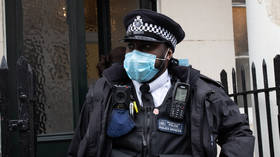Forcing 40% of London’s police to be from BAME backgrounds is virtue-signalling nonsense & will do nothing to tackle crime

The Met’s diversity target, set by Mayor Sadiq Khan is simply more woke posturing and pandering to activist groups, as are plans to recruit only Londoners and have stop-and-search incidents reviewed by community ‘scrutiny panels.’
It is difficult to find the correct adjectives to describe the latest policy that the mayor of London is adopting and imposing on the city’s besieged Police Commissioner, as she struggles with terrorism, cyber crime, Covid-19, burglary, skyrocketing murders of young black males by other black males, to say nothing of domestic violence, ‘honour based violence,’ sexual offences and fraud. What with also trying to stop continual demonstrations by one extremist group or another, I am surprised Cressida Dick even gets time to sleep.
But let us get back to adjectives to describe this policy of forcing the Met to ensure 40 percent of its new recruits by 2022 are from a Black, Asian and Minority Ethnic (BAME) background. Let me think of some appropriate ones... puerile, naïve, facile, or perhaps ill-considered and lacking in any perception of what has been tried before and failed is more correct.
As a career London police officer who was personally responsible for devising most of the tactics used by the entire Metropolitan Police in Operations Eagle Eye, Safer Streets and Blunt 2, as well as spending most of my working life dealing with inner city crime in such places as Brixton, Shepherd’s Bush and Central London, I might know a bit about street crime, who does it and how you reduce it. Certainly, the last generation of senior Met officers thought so, or they would not have let me play such a pivotal role. When I was responsible for operational leadership of Operation Blunt 2 in 2008, 29 teenagers were murdered that year. By pursuing our strategy, by 2012 we were down to only eight teenage murders a year.
Also on rt.com The murder of a long-serving copper in a UK police station is a tragedy. How was this able to happen?To address one of the ‘elephants in the room,’ I should make it clear that we saved upwards of a hundred teenage lives by focussing dedicated police resources on “putting hands in pockets.” For the uninitiated, in police speak that means stopping and searching those most likely to be involved in street crime and carrying knives. Upwards of 90 percent of the teenagers who were killed in 2008 were black males. But the biggest ‘elephant in the room’ was (and remains) that the people murdering and maiming these mostly black teenagers were… well, mostly black teenagers.
You don’t need to be a rocket scientist to work out that if we wanted to stop all these black youths being murdered by other black youths, then the people we needed to stop and search, and keep stopping and searching, needed to be black youths. So yes, there was and still is a big disproportionality in who is being searched by police. Officers would be incompetent and stupid to be focussing their street crime-control methods on any other ethnic grouping.
While we are at it, let us deal with another ‘elephant’: most victims of muggings and knife-point street robberies in London describe their attackers as young black males.
That tells me we have a real and enduring problem in London with black youths committing violent street crimes.
There is a problem with this, of course. Young males of whatever ethnicity or religion are basically full of themselves. They do not like being told to behave or to be questioned about their behaviour; it is a normal teenage thing. Any parent or grown-up male will tell you that. So, when a police officer stops a young black male, he does not like it any more than a white or Asian kid would. If that black youth gets stopped again, he likes it even less and will start to think he is being picked-on. In a way he is, but only because of the massive disproportionality of murders of black youths by black youths and the involvement in street crime by so many others.
I understand that resentment. It must be very unpleasant to be a decent black male and keep being stopped. Getting searched by a police officer with black skin and of Jamaican heritage is not going to stop that anger. Nor is any of this helped if the police officer of whatever skin colour overreacts to such resentment or loses their composure.
Also on rt.com My years in the police tell me some Islamic terrorists are likely reaching our shores in those rubber dinghies. I fear the worstSo, what is all this nonsense by Mayor Khan insisting on having 40 percent BAME in the Met Police, to match the percentage of the city’s population? How is that going to help or make things better? Yes it might make some of our well-meaning liberals or those suffering from post-colonial guilt feel warm and fuzzy to see a Nepali ex-Gurkha walking the beat (not that the police have time for that these days), but I can assure you, having worked with Gurkhas as a soldier, that Nepali police officer will not react well to insults from any black youths he deals with. Fortunately, he will not have his Kukri fighting knife with him.
I hope you see the point I am making: BAME is a broad-brush term that encompasses people with heritages as different as Jamaican, to Indian Hindu, to East African, to Muslim Asian, to Chinese or Vietnamese. To put it another way, how is a policewoman whose parents come from Saigon, and who was raised as a Buddhist, going to have any better chance of communicating with a black youth from Peckham than a white police officer from Camberwell?
In some ways you can see that BAME is really a lazy, if not ignorant, catch-all term lumping all people of colour in the same group. I think it is an insensitive insult to treat people in this way. In fact, I would argue that it’s racist in itself. And it is so inappropriate that it has no value in informing any analysis.
So what is the answer to this issue of the relationship between the police and young black people in London? What can be done to save young black youths from being murdered by other young black people? It certainly needs addressing, as I can tell you that more and more police are giving up on doing ‘stop and search’ and leaving the black youths to it.
To be fair to those officers, I do not blame them. They are damned if they do and damned if they do not. There is no upside to stopping and searching a black youth. There is a good chance it will turn into a hostile situation with the possibility the officer will be assaulted, or receiving a complaint and fearing for their careers. Why would anyone take that risk? They do not get paid any extra. Far better to help an old lady cross the road. At least you might get a nice letter to your boss.
I am not going to go into the long-term fixes that are needed: improving life opportunities, parenting skills for young mums, social deprivation. Instead, I recommend two things.
Also on rt.com My ex-police colleagues have given up trying to stop black youths carrying guns and knives because it puts their careers at riskThe first is get the black mums and aunts involved much more; whenever this has happened around London it has had good results. These women do not want their sons and nephews to die or end up in prison; if their energy and love for their boys is harnessed it is enormously powerful. We have done it before with campaigns like ‘Not Another Drop’ of blood in Brent. The women can do this.
The second is to invest even more in the ‘street skills’ of officers, on conflict resolution, emotional intelligence and arrest and restraint, to end these unseemly debacles of six officers struggling with one suspect that we see constantly on social media. This change in approach should be built-upon by restoring what was lost by policing cuts since 2010: much greater involvement by police with youth socially, in sporting events and in schools.
This will give kids the opportunity to see the police as human beings and find out what an interesting job it is they do. Undoubtedly this will improve things locally on the street, but more importantly it is how you get people from minority groups to become police officers; let them see the variety, the fun and the challenges to be had.
As for Mayor Khan’s other new idea of having stop-and-search incidents subjected to “London-wide scrutiny panels,” I have some news for him. We’ve been doing that for more than forty years, but these interactions with community activists have not been the panacea that he might hope for.
To Commissioner Cressida Dick, struggling to deal with this latest problem on her desk and her new plans to only recruit Londoners, I would make two points: we tried that before six years ago and it didn’t work then. Your most senior BAME officer would not have been allowed to join, nor would most of your BAME Commanders. They all lived outside London before they joined.
If I may offer a bit of advice to her, it would be to get someone who knows the history of what has been done before and to understand the crucial importance of positive social interactions between your officers and young people. These would be better targets to aim for than some spurious 40 percent BAME goal.
If you like this story, share it with a friend!
The statements, views and opinions expressed in this column are solely those of the author and do not necessarily represent those of RT.














